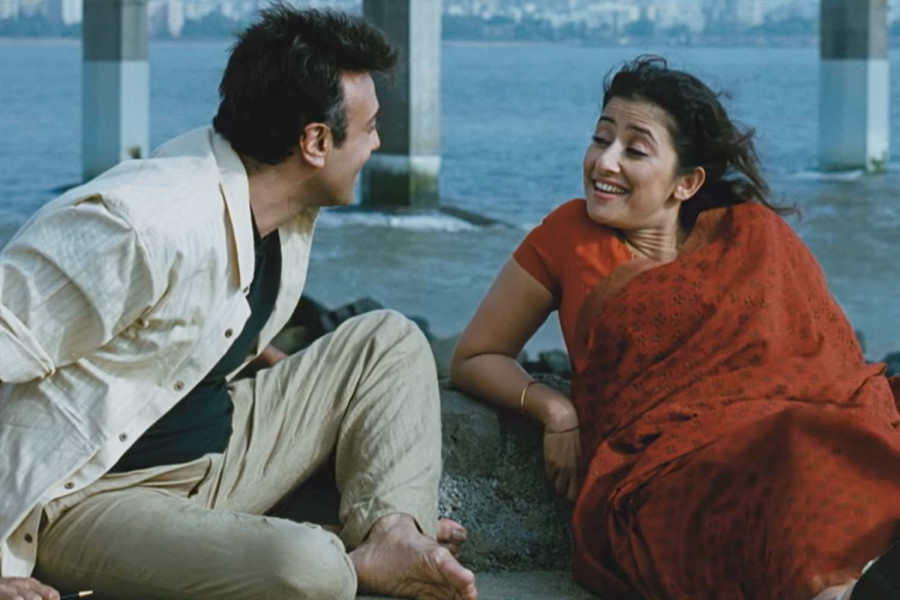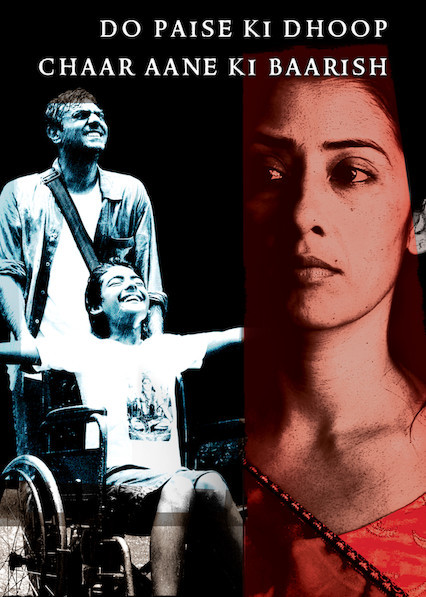Movies
Unspoken emotions and unnamed relationships
Amidst Mumbai’s relentless downpour, a struggling lyricist, a jaded prostitute, and a disabled boy form an unlikely family.
Rishika Dhakal
The current monsoon season is a perfect time to watch Deepti Naval’s ‘Do Paise Ki Dhoop, Chaar Aane Ki Baarish’. Set when Mumbai experiences torrential rain, the movie explores the unusual dynamics among three characters as their relationships blossom amidst the downpour.
The movie opens with a scene of Marine Drive in Mumbai, where Debu, played by Rajit Kapoor, is writing a song in his notebook. As the strong waves crash against the shore of Chowpatty Beach during high tide, with Debu sitting nearby, it becomes evident that the film is set to be a unique creative expression, standing apart from mainstream cinema.
The sufferings of people in Mumbai's large metropolis are often defined by catastrophic events such as the Maharashtra flood 2005. In a similar vein, the movie uses rain analogically to depict the endless cycle of sorrow of the three protagonists: the struggling lyricist Debu, played by Ranjit Kapoor, the jaded prostitute Juhi, played by Manisha Koirala, and the disabled son Kaku, played by Sanaj Naval.
The characters' convergence, setting the plot in motion, occurs in a classic Bollywood style. The meeting occurs as Juhi and Debu get seated in the same taxi as they try to run away to shelter themselves from Mumbai's unrelenting rain.
Juhi takes the passenger seat of the taxi while Debu is seated in the back. Her profession as a prostitute makes her assume Debu as her ‘client’ who needs some companionship out of her service.
Contrary to her assumption, Debu, a struggling lyricist who is in constant battle with his creative buds to make a mark in the Bollywood industry, is gay and has recently gone through a painful breakup with his boyfriend. As a result, his boyfriend has thrown him out of his place, leaving Debu homeless.
At a time when discourse around homosexuality was limited, and the portrayal of such themes was used as comic relief, this movie has taken a different approach by handling the characters with great sophistication and avoiding stereotypical portrayals of gay identity.
The movie stands out for its approach to treating Debu’s identity as a gay man with subtlety rather than overt dramatisation. The movie’s trajectory becomes predictable as Juhi takes in Debu as her maid. Familiar with his mother’s habit of bringing strangers to their home, Kaku’s first reaction to Debu’s arrival is a blend of annoyance and quiet acceptance.
Slowly and steadily, Debu triumphs in gaining Kaku’s trust. As Juhi is busy seducing strangers in clubs, Debu cleans the house, cooks food, and takes Kaku for a walk, filling the void of a father figure in Kaku’s life.

Another nuanced element of the film is the reversal of gender roles, with Juhi as the breadwinner and Debu as the homemaker. Unlike other movies that dramatise the unconventional aspects to advocate for change, this movie champions reform by avoiding highlighting society’s unfairness but by normalising what does not fit traditional standards.
As the movie progresses, Juhi’s profession faces challenges. She cannot attract clients because of her wrinkling face and her old-fashioned way of dressing up. Her dealer advises Juhi to decrease her rate to attract clients in an environment where younger, more fashionable women are capturing the market. This scene hints at the existing ageism that limits the definition of beauty to external looks.
Juhi then decides to shift her business to a more visible spot in the middle of the road. She also becomes frustrated with Debu for his ability to get close to her son.
The emotions Juhi experiences are portrayed with genuine realism. She isn’t shown as a villain just because she harbours such emotions. This depiction normalises going through emotions that do not typically fit within the moral ambit of an individual's life.
Because of this understanding, Juhi starts acknowledging the new-found relationship between Debu and Kaku. Kaku’s inclination towards nature, mainly the rain, holds another artful movie rendering.
Even though Kaku is portrayed as a non-verbal character, his expressions speak volumes, conveying emotions in a way that defies conventional acting. The constant pouring symbolises the endless nature of human sorrow and pain. Similarly, Kaku’s affinity for the rain reflects the universal truth that no matter where one goes or how one tries to escape, the experience of suffering and sorrow is inescapable.
Another scene that adds a layer of artistic depth is the depiction of an autorickshaw filled with yellow balloons. When the characters are navigating the darkest phases of their lives, the autorickshaw, emerging through the rain-soaked streets, delivers a message of hope and optimism in the face of pessimism and despair.
Separated by their struggles but bonded by their sorrows, Debu’s and Juhi’s relationship takes on a new dimension of friendship as they bond over their mutual appreciation for the masterpieces of Gulzar.
Their involvement further marks their growing friendship as a mother and a father figure in Kaku’s life. Juhi spends time with Kaku, and all three are involved in painting their house. This scene depicts the transformation of their house into a loving home.
Similarly, as they work together, Kaku silently accepts his mother’s profession. This newfound understanding improves their relationship.
From the beginning, the movie alerts the audience that no moment of happiness is guaranteed to last. This alertness comes to life when Juhi is attracted to Debu because of her desire and emotional need.
The shift in Juhi’s character, where she attempts to pursue a romantic connection with Debu, destroys the peace they believe is secure. This moment is reflected in a quote by Debu, who says that the ‘permanence of illusion makes one feel good’.
But Debu leaves the mother-son duo, explaining that their romantic relationship cannot sustain the peace they seek.
However, this does not close the door for reconciliation as Debu returns with a new-found realisation that ‘love is not about finding someone who can make you feel complete but being with someone with whom you can share your incompleteness’.
In this way, the movie has tried to change how one looks at togetherness between two people, implying that one does not need to be in an intimate relationship to form a close-knit circle of trusted people.
The platonic relationship between Juhi and Debu suggests that it is best not to label a relationship since labelling taints the purity of love. This reminds me of Gulzar’s definition of love from the movie ‘Khamoshi’,
“These are just feelings, experience them with your soul,
Let love remain love, don't give it a name.”
—
Do Paise Ki Dhoop, Chaar Aane Ki Baarish
Director: Deepti Naval
Starring: Manisha Koirala, Rajit Kapur, Sanaj Naval
Duration: 2h 2m
Language: Hindi
Available: Netflix
Year: 2009




 9.83°C Kathmandu
9.83°C Kathmandu












